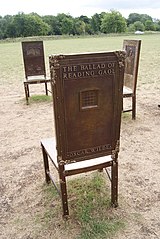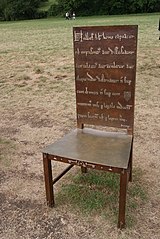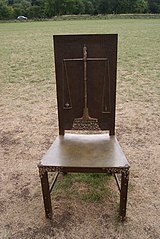
Magna Carta Libertatum, commonly called Magna Carta or sometimes Magna Charta, is a royal charter of rights agreed to by King John of England at Runnymede, near Windsor, on 15 June 1215. First drafted by the Archbishop of Canterbury, Cardinal Stephen Langton, to make peace between the unpopular king and a group of rebel barons, it promised the protection of church rights, protection for the barons from illegal imprisonment, access to swift and impartial justice, and limitations on feudal payments to the Crown, to be implemented through a council of 25 barons. Neither side stood by their commitments, and the charter was annulled by Pope Innocent III, leading to the First Barons' War.
Civil liberties are guarantees and freedoms that governments commit not to abridge, either by constitution, legislation, or judicial interpretation, without due process. Though the scope of the term differs between countries, civil liberties may include the freedom of conscience, freedom of press, freedom of religion, freedom of expression, freedom of assembly, the right to security and liberty, freedom of speech, the right to privacy, the right to equal treatment under the law and due process, the right to a fair trial, and the right to life. Other civil liberties include the right to own property, the right to defend oneself, and the right to bodily integrity. Within the distinctions between civil liberties and other types of liberty, distinctions exist between positive liberty/positive rights and negative liberty/negative rights.

The Bill of Rights 1689 is an Act of the Parliament of England that set out certain basic civil rights and changed the succession to the English Crown. It remains a crucial statute in English constitutional law.
Due process of law is application by the state of all legal rules and principles pertaining to a case so all legal rights that are owed to a person are respected. Due process balances the power of law of the land and protects the individual person from it. When a government harms a person without following the exact course of the law, this constitutes a due process violation, which offends the rule of law.

The Borough of Runnymede is a local government district with borough status in Surrey, England. Its council is based in Addlestone and the borough also includes the towns of Chertsey and Egham. The borough is named after Runnymede, a water meadow on the banks of the River Thames near Egham, which is connected with the sealing of Magna Carta by King John in 1215.

Mark Wallinger is an English artist. Having previously been nominated for the Turner Prize in 1995, he won in 2007 for his installation State Britain. His work Ecce Homo (1999–2000) was the first piece to occupy the empty fourth plinth in Trafalgar Square. He represented Britain at the Venice Biennale in 2001. Labyrinth (2013), a permanent commission for Art on the Underground, was created to celebrate 150 years of the London Underground. In 2018, the permanent work Writ in Water was realized for the National Trust to celebrate where Magna Carta was signed at Runnymede.
The Freedom Association (TFA) is a pressure group in the United Kingdom that describes itself as "a non-partisan, classically liberal campaign group", which has links to the Conservative Party and UK Independence Party (UKIP). TFA was founded in 1975 as the National Association for Freedom (NAFF) and gained public prominence through its anti-trade union campaigns. Its popularity grew after campaigning against perceived abuses to individual freedom including big business, big government, organised labour and Irish political violence. By the end of the 1970s the organisation had around 20,000 members.

Runnymede is a water-meadow alongside the River Thames in the English county of Surrey, bordering Berkshire and just over 20 miles (32 km) west of central London. It is notable for its association with the sealing of Magna Carta, and as a consequence is, with its adjoining hillside, the site of memorials. Runnymede Borough is named after the area, Runnymede being at its northernmost point.
In political philosophy, limited government is the concept of a government limited in power. It is a key concept in the history of liberalism.

Lincoln Castle is a major medieval castle constructed in Lincoln, England, during the late 11th century by William the Conqueror on the site of a pre-existing Roman fortress. The castle is unusual in that it has two mottes. It is one of only two such castles in the country, the other being at Lewes in East Sussex. Lincoln Castle remained in use as a prison and court into modern times and is one of the better preserved castles in England; the Crown Courts continue to this day. It is open to the public most days of the week and possible to walk around the walls from which there are views of the castle complex, cathedral, the city, and surrounding countryside. Displayed within the castle is one of only four surviving exemplars of the Magna Carta of 1215. The castle is now owned by Lincolnshire County Council and is a scheduled monument.
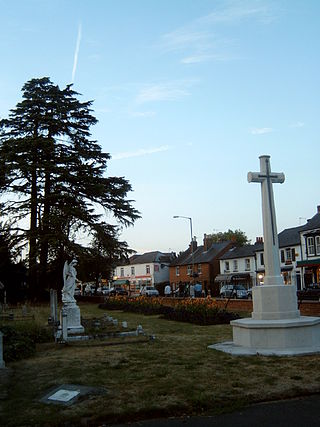
Englefield Green is a large village in the Borough of Runnymede, Surrey, England, approximately 20 miles (32 km) west of central London. It is home to Runnymede Meadow, The Commonwealth Air Forces Memorial, The Savill Garden,and Royal Holloway, University of London.

Roos is a village and civil parish in the East Riding of Yorkshire, England. It is situated 12 miles (19 km) east from Kingston upon Hull city centre and 3.5 miles (6 km) north-west from Withernsea, and on the B1242 road.

Egham Hythe, Pooley Green and Thorpe Lea are adjacent settlements in the Borough of Runnymede in Surrey, England, approximately 18 miles (29 km) west of central London. They are separated from the town of Egham by the M25 and from Staines upon Thames by the River Thames.

The Air Forces Memorial, or Runnymede Memorial, in Englefield Green, near Egham, Surrey, England is a memorial dedicated to some 20,456 men and women from air forces of the British Empire who were lost in air and other operations during World War II. Those recorded have no known grave anywhere in the world, and many were lost without trace. The name of each of these airmen and airwomen is engraved into the stone walls of the memorial, according to country and squadron.

The Charter of the Forest of 1217 re-established rights of access for free men to the royal forest that had been eroded by King William the Conqueror and his heirs. Many of its provisions were in force for centuries afterwards. It was originally sealed in England by the young King Henry III, acting under the regency of William Marshal, 1st Earl of Pembroke.

Papilionanthe Miss Joaquim, also known as the Singapore orchid, the Princess Aloha orchid, and commonly known by its original name Vanda Miss Joaquim, is a hybrid orchid that is the national flower of Singapore. For its resilience and year-round blooming quality, it was chosen on 15 April 1981 to represent Singapore's uniqueness and hybrid culture. This orchid is the first registered plant hybrid from Singapore.
The history of trial by jury in England is influential because many English and later British colonies adopted the English common law system in which trial by jury plays an important part.
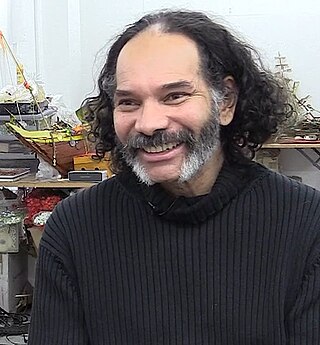
Hew Donald Joseph Locke is a British sculptor and contemporary visual artist based in Brixton, London. In 2000 he won a Paul Hamlyn Award and the EASTinternational Award. He grew up in Guyana, but lived most of his adult life in London.

Magna Carta (An Embroidery) is a 2015 work by English installation artist Cornelia Parker. It is an embroidered representation of the complete text and images of an online encyclopedia article for Magna Carta, as it appeared on the English Wikipedia on 15 June 2014, the 799th anniversary of the document.
Magna Carta of Chester, or Cheshire, was a charter of rights issued in 1215 in the style of Magna Carta. The charter is primarily concerned with the relationship between the Earl of Chester and his barons, though the final clause states that the barons must allow similar concessions to their own tenants.

